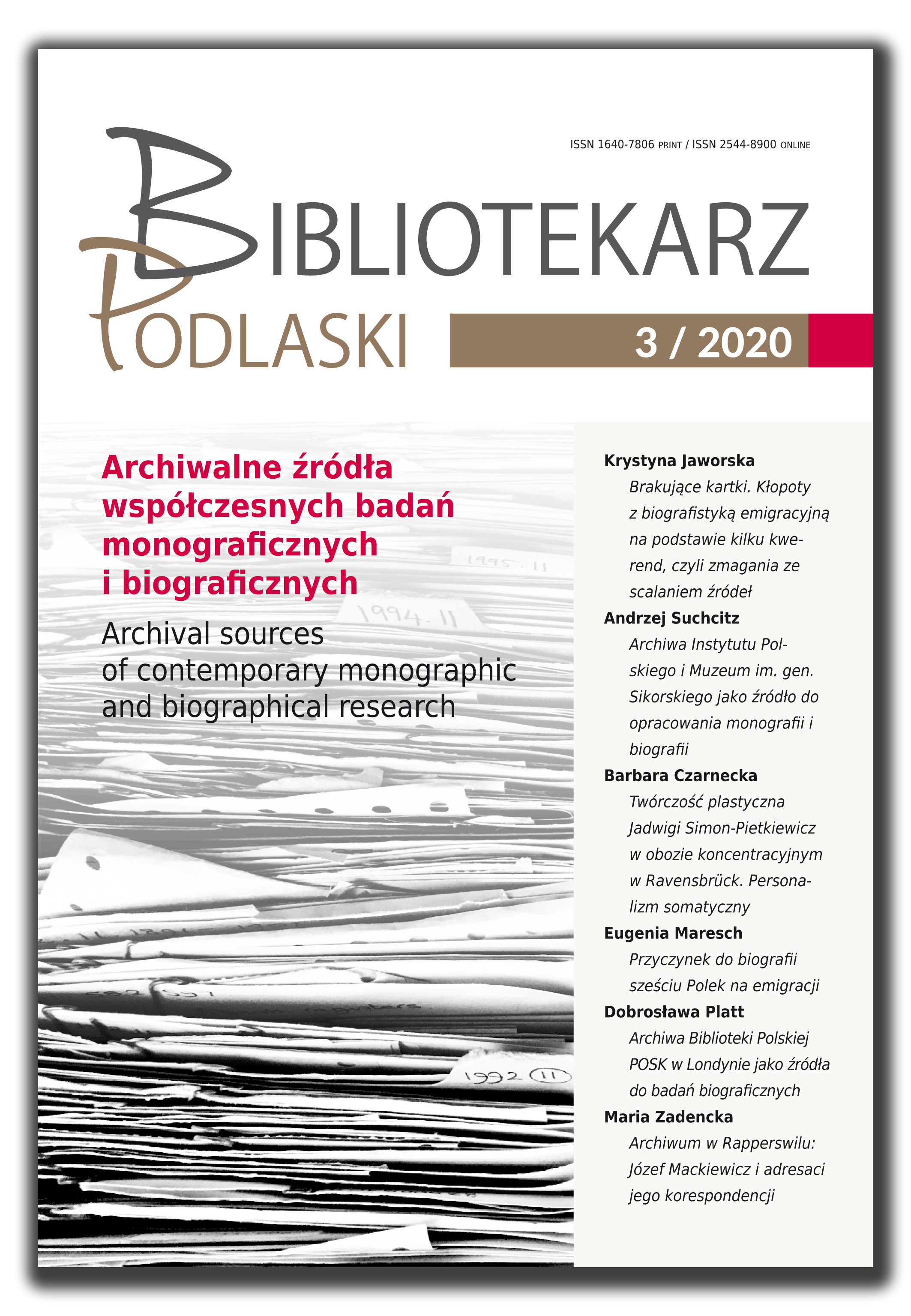Abstract
The Polish Museum in Rapperswil houses the private archive of writer, novelist and commentator on politics Józef Mackiewicz (1902–1985). This archive was catalogued and made accessible in 2006. It is of great value for studying the professional and private network of the writer. Mackiewicz maintained contacts with a large number of persons and institutions belonging to the Polish exile community and exiles from other Eastern European countries.
In the article, I propose to study this kind of material with the help of Florian Znaniecki’s concept of social circle, i.e. a “virtual audience or public to which a thinker addresses himself”. The concept helps to bring out the importance of specific emigration conditions – above all, the writer’s change of surrounding cultural environment and change of audience. Using the example of the correspondence between Józef Mackiewicz and film producer Józef Fryd (1905–1994) about (ultimately unrealized) plans to screen Mackiewicz’s novel The Colonel Myasoyedov Affair (1964), I show how the discussion on the script highlights his changing perception of the audience, and his adjustment to another media. Mackiewicz’s letters constitute the rare occasion when he comments in detail on the novel.
References
Fitas A., Model powieści Józefa Mackiewicza, Seria: Literatura współczesna – pisarze i problemy 2, Lublin: Towarzystwo Naukowe Katolickiego Uniwersytetu lubelskiego, 1996.
Fryd J., [Listy do Józefa Mackiewicza 10.09.1971 oraz 18.09.1971]. – Spuścizna po Józefie Mackiewiczu (1902–1985), MP Rapperswil [I/A/11].
Gass I., Furma E., Tomczak A., Spuścizna po Józefie Mackiewiczu (1902–1985) opracowana na podstawie wytycznych Archiwum Polskiej Akademii Nauk opracowania spuścizn archiwalnych po uczonych, Raperswil 2006.
https://polenmuseum.ch/wp-content/uploads/2018/11/polenmuseum-inrapperswil-1-mackiewicz-jozef.pdf (pobrano 10.10.2019).
Mackiewicz J. [List do Josepha Fryda] 14.09.1971. – Spuścizna po Józefie Mackiewiczu (1902–1985) MP Rapperswil [I/A/11].
Mackiewicz J., Sprawa pułkownika Miasojedowa, Londyn: B. Świderski, 1962. Kontra, Londyn 1983, 1989, 2007 (Dzieła, t. 4).
Mackiewicz J., Tak zwany Wschód europejski, „Wiadomości” 19.05.1957, Rok 12, nr 20 (581). http://retropress.pl/wiadomosci/tak-zwany-wschod-europejski/ (pobrano 15.03.2020).
Rosenstone R., Visions of the Past: The challenge of Film to Our Idea of History, Cambridge, MA: Harvard University Press, 1995, s. 6.
Zadencka M., Obrazy suwerenności. O wyobraźni politycznej w literaturze polskiej XIX i XX wieku, Warszawa: Instytut Badań Literackich PAN, 2007.
Zadencka M., The Shape of Europe in the Works of Oskar Halecki, Józef Mackiewicz, and Marian Kukiel, [w:] red. Maria Zadencka, Andrejs Plakans, Andreas Lawaty, East and Central European History Writing in Exile 1939–1989, Leiden: Brill Academic Publishers, 2015, s. 263-281.
Zmagania z historią. Życie i twórczość Józefa Mackiewicza i Barbary Toporskiej. Materiały z konferencji w Muzeum Polskim w Rapperswilu z cyklu „Duchowe źródła nowej Europy”, Zamek Rapperswil, 26-28 września 2006 r., red. N. Kozłowska i M. Ptasińska, Warszawa: Instytut Pamięci Narodowej. Komisja Ścigania Zbrodni przeciwko Narodowi Polskiemu, 2011.
Znaniecki F., Social Role of the Man of Knowledge, New York: Columbia University Press, 1940.
Articles published in the “gold open access” mode on the basis of a non-exclusive license agreement between the publisher and the author. Permitted use:
- the publication may be read and stored on any device,
- the publication may be cited (with obligatory reference to the author, the title of the text, as well as the full title, bibliographic address of the issue and page of the journal)
The editorial team of “Bibliotekarz Podlaski” implements an open access policy by publishing materials in the form of the so-called Gold Open Access. From volume 42 (issue 1/2019), the journal is available under the Creative Commons license (Attribution – ShareAlike: CC BY-SA).
The key declarations of the Open Access and Open Science movement, which we fully support, are available on the CEON Open Science website.
COPYRIGHT:
The editorial team of “Bibliotekarz Podlaski” implements an open access policy by publishing materials in the form of the so-called Gold Open Access. The journal is available under the Creative Commons license – Attribution – ShareAlike 4.0: International: CC BY-SA 4.0).
The key declarations of the Open Access and Open Science movement, which we fully support, are available on the CEON Open Science website.
“Bibliotekarz Podlaski” allows its readers to read, download, copy, distribute, print, search and link to the full content of articles. We enable full, immediate, unlimited (both in a territorial, temporal and technical sense) open access to all published content, in accordance with the principle that freely available research increases and accelerates the global development of science and the exchange of knowledge.
The editorial team of “Bibliotekarz Podlaski” encourages authors to place articles published in the journal in open repositories (after the review or the final version of the publisher), provided that a link to the journal’s website is provided.
The journal does not charge the authors any fees for accepting and publishing their texts.


